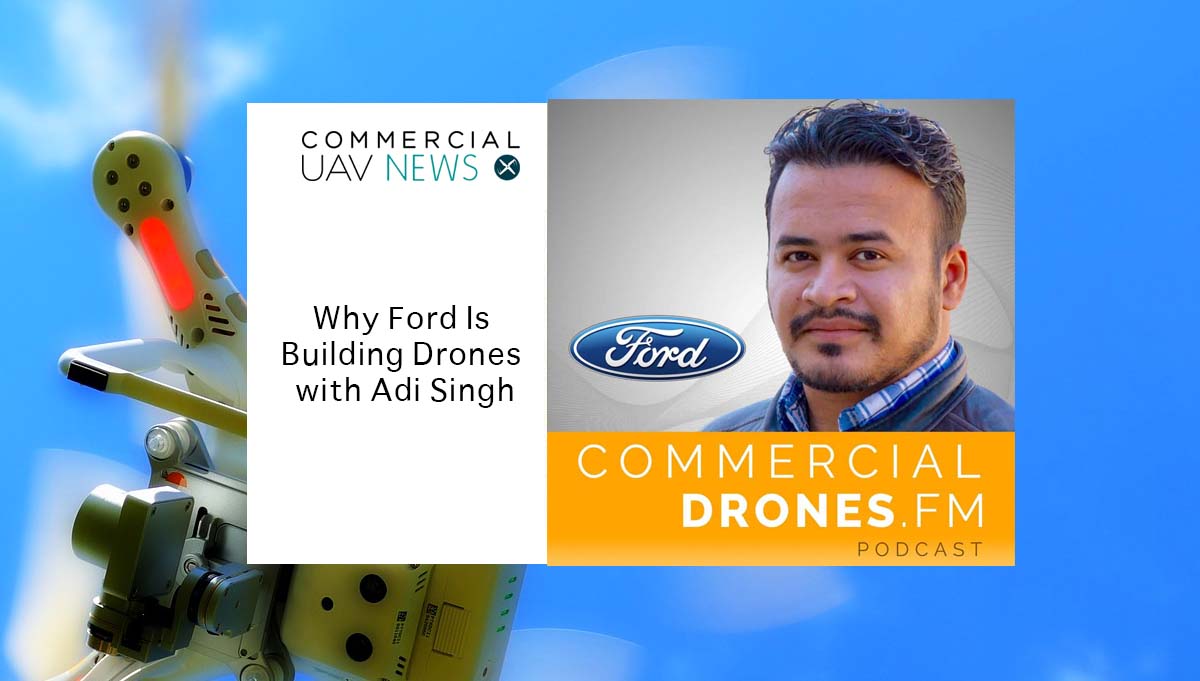Subscribe
The information you submit will be stored and used to communicate with you about your interest in Commercial UAV News. To understand more about how we use and store information, please refer to our privacy policy.
July 10, 2018
License Plates for Drones and Urban Air Mobility for Ford - Commercial Drones FM Podcast Insights

Adi Singh, Principal Scientist for UAV Systems at Ford’s Silicon Valley office, has turned into a mainstay at a variety of drone industry events, but that hasn’t stopped him from getting questions about why Ford is interested in the technology to begin with. His answer is an illuminating one, as this technology is something Ford is committed to because they’re a mobility company, and their interest in drone technology is an organic development of that interest.That’s just one of the insights host Ian Smith discusses with his guest on episode #72 of the Commercial Drones FM Podcast - Why Ford Is Building Drones with Adi Singh. The two also explore what sort of model the drone industry can look to when it comes to regulation and registration, how urban air mobility will become possible from a technical and regulatory standpoint, and much more.We caught up with Ian to discuss a few of these details from his perspective. Read through the additional insights before or after listening to the podcast below. You can also listen to the episode on iTunes or GooglePlay. Jeremiah Karpowicz: Does Adi’s answer about Ford being interested in drone technology because they’re first and foremost a mobility company, rather than an automobile company, strike you as an example of what it means for a company to be forward-thinking, or are they just trying to avoid being disrupted?Ian Smith: It's definitely a little bit of both. By virtue of them being a mobility company, they naturally have to have their minds set on what's next. It was really impressive seeing their research laboratory in Silicon Valley. It perfectly framed the method in which they're taking this—they obviously don't want to be disrupted so the research arm's imperative is to disrupt Ford (internally) before someone else does (externally). When it comes to urban air mobility, do you ever worry about focusing too much on the future at the expense of the present? That is to say, using a drone as a means of transportation is something that might represent level 10 of drone technology/regulation, but today, we’re only on level 2. Shouldn’t we be more focused on level 3 than level 10?Interesting point. I think that is definitely the case here and has been for quite some time in drones themselves—we have our own levels within the industry which folks are focused much further out on. But that can definitely be healthy. The reality is, unmanned passenger aircraft are many years out but that doesn't stop Ford or Uber or other companies from preparing themselves and taking an early stance. If you look at companies like Larry Page's Kitty Hawk, they're starting much lower in level with their recreationally-focused Flyer eVTOL aircraft. Are privacy concerns when it comes to Remote ID overblown? Nobody wants the government or anyone else to be able to access private information, but how much of the information that could/will be accessible via that kind of system not be available via other means? Does the issue here really come down to where different people want to draw the line between privacy and security?I definitely don't think they're overblown. Remote ID is so necessary. Adi made a great point when comparing Remote ID for drones to license plates on cars. Imagine if everyone on the road drove around without any identification, or license plate—how would you be able to hold anyone accountable for safety and upholding the law? It'd be a complete mess. Right now, the drone industry resembles that scenario. It's incredibly difficult to catch any bad actors or intentional (or unintentional) lawbreakers. It's all in the name of safety and a standardized Remote ID system is imperative for the commercial drone industry to grow. Is that automobile registration/licensing model really something the drone industry can look to, or are they ultimately just too different?There's a lot of crossover between the two industries. The automobile industry has kind of "been there, done that" and they have a lot of valuable learnings from that. They're even still under scrutiny today with the entire regulatory framework regarding self-driving cars. Fortunately, both the proliferation of drones and self-driving cars are happening at nearly the same time, which is incredibly exciting. Ford will be leveraging their expertise as time goes on and as drones become even more commonplace, regulations will be even more onerous, which is a scenario that Ford is no stranger to managing. The concept of a drone coming with a new F-150 is something that the company hinted at in their "Why a Car Company Is Looking to the Skies” post, and the possibilities there are exciting to think about. How feasible do you think that is for them in the near-future?As much as I think it's super neat to have a drone come with your car, I think that it's somewhat gimmicky in its current ideation. Technologically, it doesn't seem out of reach but regulatory-wise, it may be a tougher pill to swallow. There are a lot of considerations to take into account here—what if the driver wants to pop out the drone on the highway? Or if they're in controlled airspace? It's generally trivial for the OEM to build-in fail-safes to prevent that but I, at least right now, can't see a near-future where a consumer is deciding on which truck to buy and picks that one that includes the drone. Also, there's nothing stopping anyone from buying a drone and putting it in the back of their truck. We'll have to see what approach Ford takes here.














Comments